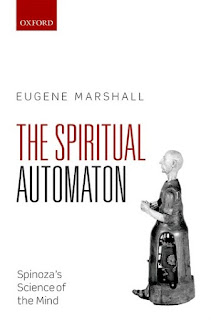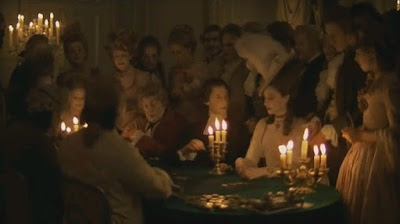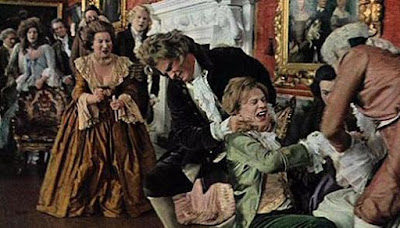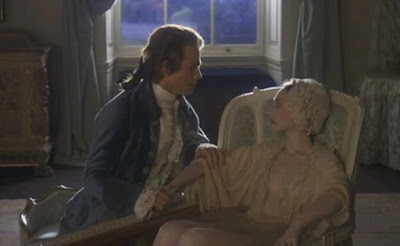When we are chasing a departing bus or fighting for the last
serving of the meal, how often do we leave behind the mundane and think about
our origins, and where we are off to in the far future? While we may possess the consciousness and
subjectivity to assert our self values throughout our existence, do we really
appreciate Man's place in the universe? While the transformations of humanity
throughout history are as diverse and wonderful as a cinematic experience, are
there any timeless urges and needs that we have dragged along throughout the
many pages of our own tales? What sort of inspirations do we need in order to
facilitate us to think outside the box, and then lead us to a future beyond the
borders of our imaginations? Some time during our lives, we will possess an
inquisitive mind to ask, or explore, these questions which seldom lead to
simple answers. If a single film can capture all these ideas and motivate or
inspire the audience to face these difficult questions, then that film deserves
an iconic status in the Hall of Fame of Film Art. Such an epic film does exist
- it is the gift Stanley Kubrick has offered to humanity 49 years ago – ‘2001:
A Space Odyssey’ (1968)!
‘2001: A Space Odyssey’ is THE Stanley Kubrick film – no
matter one has any preferences for the other films by Kubrick, one has to admit
that ‘2001’ is the unsurpassed monolith that stands proudly in the cinematic
universe, and it is the film Kubrick will always be remembered for. Even by the
standard of today, ‘2001’ is still extremely daring, visionary and
revolutionary. The film challenges the very assumptions of traditional cinema –
the need for a narrative to offer the audience a ‘meaningful’ story. Kubrick,
in collaboration with the great writer Arthur C. Clarke, has subverted the
expectations for audience familiar with American cinema. ‘2001’ employs ambiguous
and memorial visual images, minimal dialogues, and a stunning use of classical
music, to contrast the images shown on the screen. The result is a poiesis of
visual images, sound, music, and most important, ideas that inspire generations
of audience. ‘2001’ was made when Kubrick was at the height of his power. Films
like ‘2001’, ‘A Clockwork Orange’, ‘Barry Lyndon’, and the unrealized
‘Napoleon’ all serve as testaments for his monumental will to turn the whole
cinematic universe around. This ‘cinematic Napoleon’ made all these films with
intense confidence, knowing that they will re-define film art and inspire awe
from the later generations of movie lovers.
While many audience ad critics clearly were not ready for
such an experimental approach back in 1968, the status of ‘2001’ has gradually
increased throughout the years. Now, it is fair to consider ‘2001’ as one of
the most iconic, if not the greatest, films in the history of cinema. The film
did receive a number of Oscar nominations, and Kubrick was nominated with Best
Director and Original Screenplay. He also won his only Oscar – for the Visual
Effects. Ironically, the all-time-greatest science fiction film did not receive
a nomination in the Best Picture category, while it has literally influenced
every single science fiction film ever since.
Why is ‘2001: A Space Odyssey’ considered an important film?
The film is a milestone in the history of Science Fiction cinema, because it
completely changes the impression of audience towards science fiction. Before
‘2001’ came out, science fiction films tended to have a low budget, simple
storyline, and the genre was not a respectable field when one compared it to
the other serious genres. ‘2001’ is the first film that blasts the science
fiction genre to its full potential. First, the scientific realism is extremely
impressive even the film is nearly 50 years old – the preceding science fiction
films before ‘2001’ have never provided such an authentic and realistic
portrayal of future technology. In terms of content, ‘2001’ is a very ambitious
film indeed . The film is not merely about space travel, it is about us – the
story of humanity. Kubrick, who has synthesized the ideas from important thinks
such as Friedrich Nietzsche, Charles Darwin, Albert Camus, Sigmund Freud, and
Robert Ardrey, has created a visual poem which demands a subjective
participation and contribution from the engaging audience, rather than asking
for an impartial or final meaning common in Wikipedia plot sections. It is YOU,
as a member of the audience, who have to engage with the images and have your
own take on what the film means to you. Through ‘2001’, Kubrick has offered
starting points for us to think about what humanity means, our origin and potential
destination, and our position in the universe. It is far to say that '2001' is sort of a cinematic version of Nietzsche's ideas! Science fiction films before
‘2001’ have seldom dealt with such serious and philosophical questions, and since
then science fiction films have become more thought-provoking and inspiring,
without necessarily compromising the fascinating or entertaining factors that
accompany the films. Star Wars, Close Encounters of the Third Kind, Alien, Blade
Runner, The Terminator, Wall-E, Gravity, Interstellar - and many other
brilliant science fiction films, would not be possible if their creators were
not inspired by ‘2001: A Space Odyssey’. ‘2001’ has also inspired non-Science
Fiction films, too – Paul Thomas Anderson’s ‘There Will Be Blood’ and Terence
Malick’s ‘The Tree of Life’ are nice examples. ‘2001’ is more than a mere
science fiction film - it is a masterpiece for anyone who is inquisitive enough
to find out what we really are.
'Why doesn't Pauline Kael like my movie?'
- Stanley Kubrick
on 2001: A Space Odyssey's initial reception
Because I go into ‘2001: A Space Odyssey’ in the coming
articles, I would like to de-mystify some misunderstandings regarding this
one-of-a-kind film. While ‘2001’ is most certainly an iconic film, it is also a
‘Marmite’ sort of movie – you either love it or hate it to the high end. Many
people are misled by some false information regarding ‘2001’, and this has led
to unrealistic expectations and eventually ends with complete disappointment
and ultimate sterility. Some audience label ‘2001’ as a ‘cold’, ‘boring’, and
‘pretentious’ film, and this is not at all unjustified. Let me be frank – if
you want to watch an exciting and warm science fiction film, I would recommend
something like Passengers (2016) rather than ‘2001’. It is weird why some
people assume ‘2001’ as entertaining if it is a popular or iconic film – these
individuals will most certainly be disappointed. Because Kubrick has never
intended to make ‘2001’ an exciting or sentimental film. He wanted to provoke
the audience to feel and contemplate about some elemental questions which are
so important for all of us. ‘2001’ is a cinematic experience that requires an
active participation from the audience, rather than a normally passive way of
receiving a story from the movie screen. If the stunning imageries abundant in
‘2001’ have arisen your awe and have inspired you to give some thoughts about
human nature, then the film has succeeded. Steven Spielberg has stated that
succinctly before – you would not feel emotional because you were watching the
spacecrafts in the film, yet you would feel emotional out of gratitude to
Stanley Kubrick, who was willing to make this film for all of us. I completely
agree to this sentiment.
‘2001’ is a cold film, yet I feel the coldness is not an emotional
coldness – it is more appropriate to label it as a ‘philosophical coldness’. This
coldness is like reading Spinoza’s philosophy, that of equating God with an
impersonal nature. Kubrick is showing us a realistic depiction of the universe
– an indifferent, desolate cosmo, and how humans interact with it and also with
the various machines they have created.
The cold atmosphere is also enhanced by Kubrick’s
anti-humanist stance and the his central theme of dehumanization, which are evident
in ‘2001’, ‘A Clockwork Orange’, ‘Barry Lyndon’ and the script of the
unrealized ‘Napoleon’. Throughout ‘2001’, Kubrick has suggested anti-humanist
perspectives regarding many issues of humanity, and these viewpoints have challenged
the very assumptions many traditional films are based on. It can be understood
because Kubrick has been influenced by anti-humanist thinkers such as Nietzsche
and Ardrey, and he has also expressed concerns about some of Rousseau’s ideas,
through interviews around that time and in the script of ‘Napoleon’. For
Kubrick, humanity is caught between the struggle of 3 forces – our instinctual
drives, the systems that control us, and the indifferent universe. Therefore, ‘2001’
can be seen as a double to ‘Barry Lyndon’, or, even more satisfying, his
unrealized ‘Napoleon’ – because all these films are addressing these
conflicting forces that define human existence.
So, other than saying ‘2001’ is ambiguous – which is
certainly true – I would say ‘2001’ is also an ambivalent film, because many
scenes can lead to double, or even contradictory conclusions, and Kubrick has
made no attempts to resolve any for the audience. Did the ‘bone-to-spacecraft’
an optimistic scene about how far humans have evolved, or the most pessimistic
moment of dehumanization in human history? Did the shadow boxing scene represent
liberation, or humanity’s helpless entrapment in the mechanical order we have
created? Did the final transformation to the Star Child represent humanity’s
ultimate triumph, or an expression of eternal loneliness in the universe? Kubrick
did not provide any answers, because he trusted his audience – he was confident
that his audience would have the courage and ability to make up their own mind.
That is why I think ‘2001: A Space Odyssey’ is a timeless masterpiece, and
humanity should be proud that a member of our species has been able to create
such a wonderful achievement.
The next part: The Dawn of Man
4/3/2017
Film Analysis


















